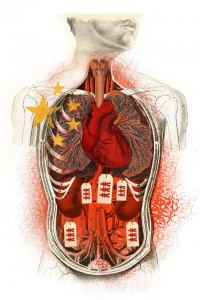SMITH: China’s illegal organ harvesting

By U.S. Congressman Christopher H. Smith
The Washington Times
September 18, 2012
Transplant consent in theory only
Over the decades, American doctors, medical schools, hospitals and pharmaceutical companies developed skills and knowledge enabling life-giving transplants of organs including hearts, kidneys, livers, lungs and corneas. These skills and knowledge have spread around the world.
These skills can be abused or used to set in motion sales of organs by the poor or favoritism for the rich. Consequently, the international community has developed demanding protocols to assure that organ donations follow strict procedural and ethical guidelines, codified by the Declaration of Istanbul in 2008. One bedrock principle is that donors must give consent. Another is that condemned prisoners cannot be donors. Extending these principles, medical journals will not publish articles on transplant research if organs came from executed prisoners.
In the mid-1990s, I began holding hearings on the practice of organ harvesting of prisoners in China, and unfortunately, the controversial practice has not gone away. At a hearing for which I was co-chairman last week, two subcommittees of the House Foreign Affairs Committee heard that even though few Chinese voluntarily donate organs, China stands next behind the United States in the yearly number of organ transplants. With 600 transplant centers, it has become a destination for “transplant tourism.” Each transplant of a heart or liver can provide more than $100,000 in revenue.
What adjectives can we use to describe the prospect that Chinese doctors and hospitals are engaged in large-scale harvesting of human organs for profit? The ordinary words such as “disturbing,” “appalling” or even “shocking” are inadequate.
So far, I have referred to ordinary transplants. But there’s a graver prospect. It is that Chinese military doctors may be engaged in organ harvesting from prisoners and labor-camp detainees, especially prisoners of conscience.
China’s vice minister of health acknowledged in 2005 that almost all organs come from executed prisoners, but the number of executions in China is a “state secret.” In China, there are no firm statistics, no open waiting lists and no transparency in the granting of “consent.” From the few times Chinese doctors or health officials have discussed China’s transplant system at international meetings, the figures don’t add up. The best available outside estimates indicate that the number of transplants apparently exceeds the number of criminal executions. So then, what is the source of the additional organs?
A witness at the hearing, Ethan Gutmann, interviewed Chinese medical personnel now outside China. He learned of the removal of organs by teams of military doctors in medical vans immediately after executions. The victims, he learned, came from China’s prisons or from re-education through labor camps — far from justice and investigation. They are, of course, unable to escape and testify, and expeditious cremation destroys physical evidence.
Some Falun Gong practitioners released from labor camps report that the camp doctors gave them frequent physical examinations, with special attention to their blood type and the health of their kidneys, livers, lungs, hearts and eyes — “the retail organs.”
Many members of this spiritual movement — unjustly held, abused, subjected to psychological and physical torture for nothing more than fidelity to “truthfulness, compassion and forbearance” — refused to reveal their names when taken into custody. They feared reprisal against relatives and other practitioners. Their anonymity made them vulnerable to having their lives taken from them to provide organs for transplants.
The most gruesome testimony came from Chinese doctors who told Mr. Gutmann that some of the organs for transplant came from still-living victims.
Yes, these reports of horror sanctioned by a modern state beg for evidence, and proof is in short supply. But this possibility pushes us into a horrific beyond, a beyond that challenges our language, making “barbaric” too calm a word, too leached of horror.
We all hope these fragmentary reports and the circumstantial evidence do not add up to barbarism. Here, tragically, the track record of other Chinese policies does not give confidence. In China, a mother protesting inadequate sentences meted out to criminals who abducted and sold her 11-year-old daughter into sexual slavery was herself sentenced to re-education through labor. In China, many women are forced to abort their children as routine policy, even in the third trimester. Others endure forced sterilization. In China, the Communist Party stands above the law. We hope there are other explanations for the evidence, but we cannot rest until we know more.
China’s state- and party-controlled media say China’s people know they benefit from the glorious leadership of the Communist Party. The truth is different. China’s people have hearts that yearn for freedom and faith, lungs that long to breathe clean air and eyes that hope to see a better future. When China has become a destination for “transplant tourism,” when aging party cadres receive organs from those in prisons and labor camps, when some of those organs are taken from religious and political dissidents, when the Communist Party speaks of hearts, we know it is not speaking of love, devotion or loyalty. It is thinking of dollar signs.
Rep. Christopher H. Smith, New Jersey Republican, is chairman of the U.S. Congressional-Executive China Commission and the House Foreign Affairs subcommittee on Africa, global health and human rights.
